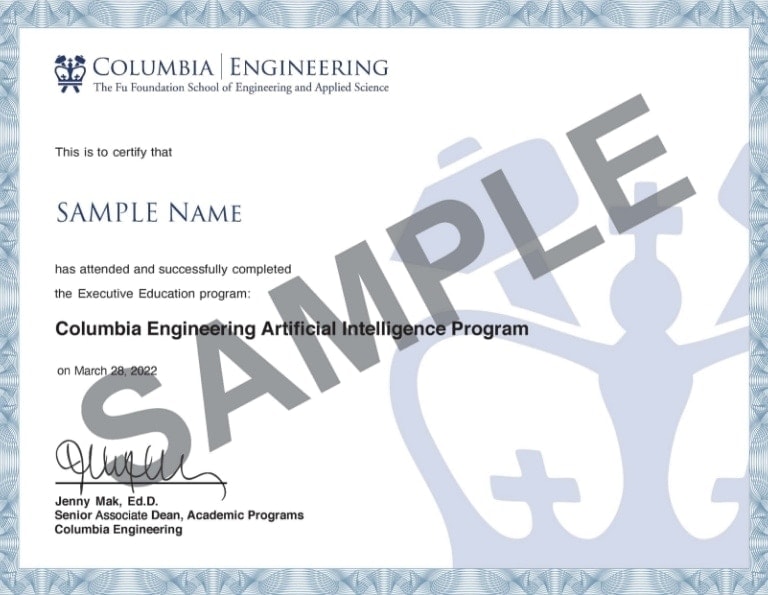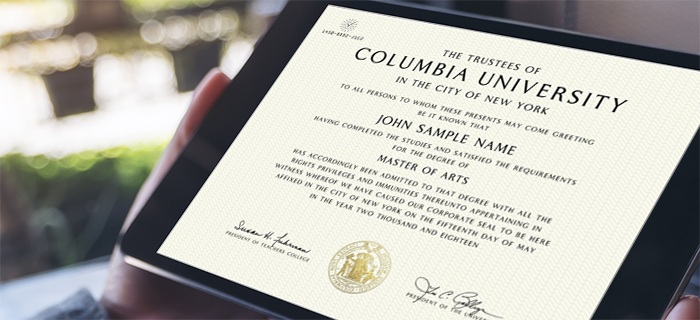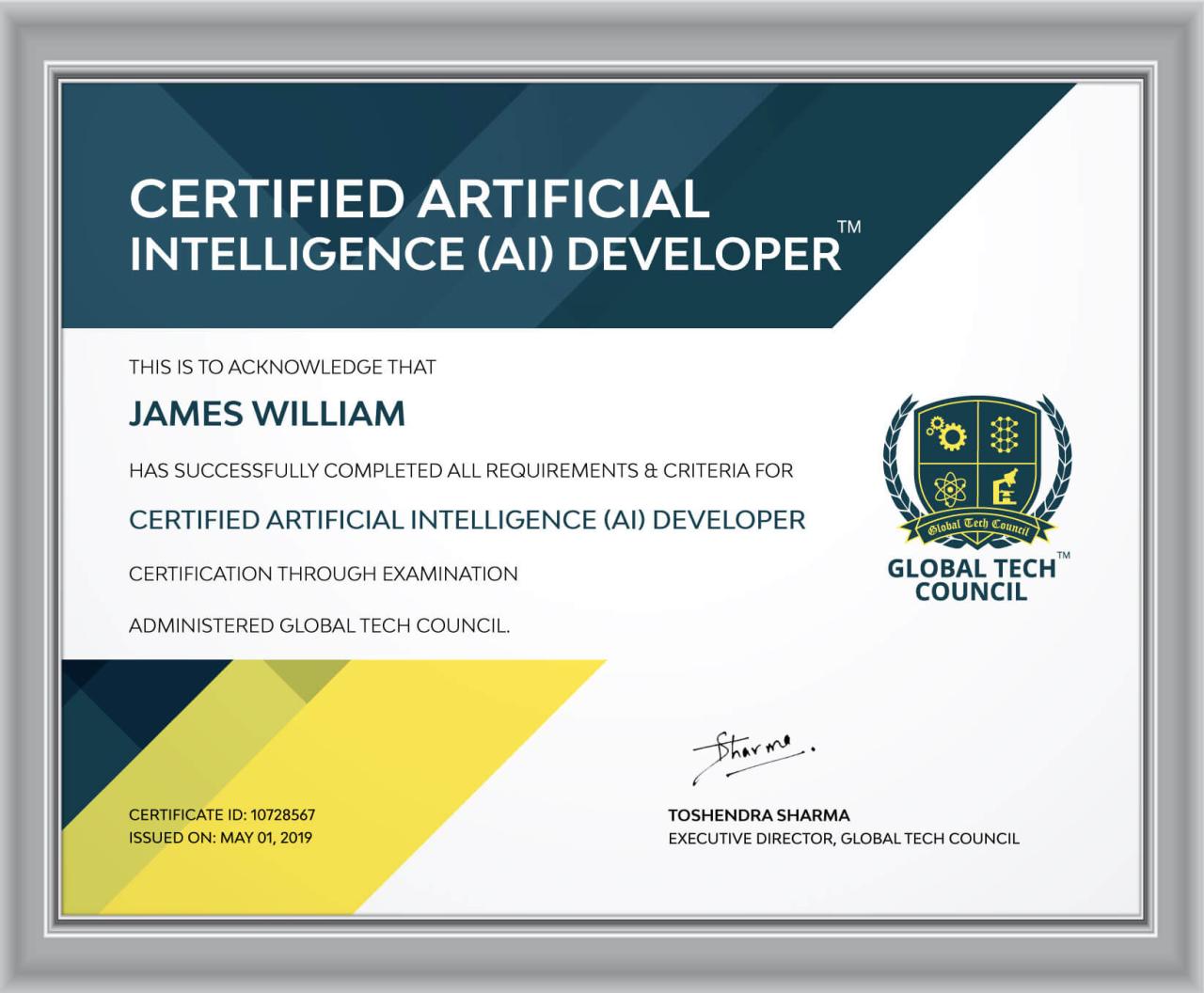The Columbia University AI Certificate Program is a gateway to a future-proof career in the rapidly evolving field of artificial intelligence. This program, designed for professionals and aspiring AI experts, provides a comprehensive foundation in the core principles and applications of AI, equipping you with the skills and knowledge to thrive in the dynamic world of data science, machine learning, and automation.
Offered by one of the world’s leading academic institutions, the program boasts a rigorous curriculum taught by renowned faculty who are at the forefront of AI research and innovation. The program’s unique blend of theoretical concepts and hands-on projects prepares you for real-world challenges and equips you with the practical skills sought by top employers in the industry.
Program Overview

The Columbia University AI Certificate Program is a comprehensive online program designed to equip individuals with the foundational knowledge and practical skills necessary to succeed in the rapidly evolving field of Artificial Intelligence (AI).
This program caters to a diverse audience, including professionals seeking to enhance their career prospects, aspiring data scientists, and individuals interested in understanding the transformative power of AI.
Curriculum and Structure
The program’s curriculum is meticulously structured to provide a well-rounded understanding of AI concepts and techniques. It covers a wide range of topics, including:
- Introduction to AI: This module lays the groundwork by introducing the fundamental concepts of AI, its history, and its various applications across different industries.
- Machine Learning: This module delves into the core principles of machine learning, covering supervised, unsupervised, and reinforcement learning algorithms. Participants gain practical experience in building and deploying machine learning models.
- Deep Learning: This module explores the powerful techniques of deep learning, focusing on neural networks, convolutional neural networks, and recurrent neural networks. Participants learn how to design and train deep learning models for various tasks.
- Natural Language Processing (NLP): This module covers the processing and understanding of human language by machines. Participants learn about techniques like text classification, sentiment analysis, and machine translation.
- Computer Vision: This module focuses on the ability of computers to “see” and interpret images and videos. Participants learn about image recognition, object detection, and video analysis techniques.
- Ethics and Societal Impact of AI: This module addresses the ethical considerations and societal implications of AI, emphasizing responsible AI development and deployment.
Program Duration and Workload, Columbia university ai certificate program
The Columbia University AI Certificate Program is a flexible online program that can be completed at your own pace. However, it is estimated to take approximately 6 months to complete the program, assuming a consistent workload of 10-15 hours per week. The program consists of a series of modules, each with its own set of lectures, readings, assignments, and quizzes.
Key Program Features
The Columbia University AI Certificate Program stands out for its comprehensive curriculum, distinguished faculty, and practical applications. It offers a unique blend of theoretical knowledge and hands-on experience, preparing students for a wide range of careers in the rapidly evolving field of artificial intelligence.
Program Strengths and Unique Selling Points
The program’s strengths lie in its comprehensive curriculum, its focus on practical applications, and its distinguished faculty. It covers a broad range of AI topics, including machine learning, deep learning, natural language processing, computer vision, and robotics. The program also emphasizes hands-on experience through projects and case studies, allowing students to apply their knowledge to real-world problems.
Faculty Expertise in AI
The program is taught by leading experts in AI from Columbia University, including professors with extensive research experience and industry collaborations. They bring their cutting-edge knowledge and real-world experience to the classroom, providing students with a unique perspective on the field.
Comparison with Similar Offerings
The program distinguishes itself from other AI certificate programs by offering a rigorous curriculum that balances theoretical foundations with practical applications. Unlike some programs that focus solely on technical skills, the Columbia program also emphasizes the ethical and societal implications of AI, preparing students for a responsible and impactful career in the field.
Industry Partnerships and Collaborations
The program benefits from strong industry partnerships and collaborations, providing students with access to real-world data, projects, and networking opportunities. These partnerships connect students with leading AI companies, allowing them to gain practical experience and explore potential career paths.
Admission Requirements and Application Process: Columbia University Ai Certificate Program
The Columbia University AI Certificate Program is designed for professionals seeking to enhance their understanding and skills in artificial intelligence. The program is open to individuals with a diverse range of backgrounds, including those with undergraduate degrees in computer science, engineering, mathematics, statistics, or related fields.
To apply for the program, you must meet the following admission requirements and complete the application process Artikeld below.
Admission Criteria
The admission criteria for the Columbia University AI Certificate Program are designed to ensure that applicants possess the necessary foundation and motivation to succeed in the program. The admissions committee carefully reviews each application to assess the applicant’s academic background, professional experience, and commitment to learning.
- A bachelor’s degree from an accredited institution.
- A strong academic record, demonstrating a solid foundation in mathematics, statistics, and computer science.
- Relevant professional experience in a field related to AI or technology is preferred but not required.
- A statement of purpose that Artikels your reasons for pursuing the program, your career goals, and how the program will help you achieve them.
- Two letters of recommendation from individuals who can attest to your academic abilities and professional potential.
- A resume or curriculum vitae that highlights your relevant skills and experience.
- English proficiency for non-native English speakers.
Application Process
The application process for the Columbia University AI Certificate Program is straightforward and user-friendly. The application is submitted online through the university’s application portal.
- Create an account on the Columbia University application portal.
- Complete the online application form, providing accurate and detailed information about your academic background, professional experience, and career goals.
- Submit your official transcripts from all previously attended colleges and universities.
- Provide two letters of recommendation from individuals who can speak to your academic abilities and professional potential.
- Submit your resume or curriculum vitae, highlighting your relevant skills and experience.
- For non-native English speakers, submit proof of English proficiency through standardized tests like TOEFL or IELTS.
- Pay the application fee, which is waived for certain applicants.
Application Deadlines
The application deadlines for the Columbia University AI Certificate Program vary depending on the program start date. It is crucial to check the program website for the most up-to-date deadlines.
Financial Aid and Scholarships
The Columbia University AI Certificate Program offers various financial aid and scholarship opportunities to help students finance their education.
- Need-based financial aid: The university provides need-based financial aid to eligible students, which may include grants, loans, and work-study programs. Applicants are encouraged to complete the Free Application for Federal Student Aid (FAFSA) to determine their eligibility for federal financial aid.
- Merit-based scholarships: The university offers merit-based scholarships to outstanding students who demonstrate exceptional academic achievements, leadership qualities, and commitment to their field of study. These scholarships are typically awarded based on a competitive application process.
- External scholarships: Students can also explore external scholarship opportunities offered by various organizations, foundations, and government agencies. Many resources are available online to help students find scholarships that match their specific criteria.
Admissions Process Insights
The admissions committee at Columbia University evaluates applications holistically, considering a variety of factors beyond academic transcripts and test scores.
- Academic performance: The admissions committee reviews your academic record, including your GPA, coursework, and any relevant research or projects. They look for evidence of strong analytical skills, a solid foundation in mathematics, statistics, and computer science, and a demonstrated ability to succeed in challenging academic programs.
- Professional experience: Relevant professional experience in a field related to AI or technology is highly valued. The admissions committee considers the quality and relevance of your work experience, your contributions to your field, and your ability to apply your knowledge and skills to real-world problems.
- Statement of purpose: Your statement of purpose is a critical component of your application. It should clearly articulate your reasons for pursuing the program, your career goals, and how the program will help you achieve them. The admissions committee looks for evidence of your passion for AI, your understanding of the field, and your ability to articulate your goals in a compelling and persuasive manner.
- Letters of recommendation: Letters of recommendation provide valuable insights into your academic abilities and professional potential. The admissions committee looks for letters that are specific, detailed, and provide concrete examples of your skills and achievements. They also consider the reputation and experience of the recommenders.
- Overall fit: The admissions committee evaluates your application in the context of the program’s goals and objectives. They look for applicants who demonstrate a strong commitment to learning, a passion for AI, and the potential to make significant contributions to the field.
Career Outcomes and Job Prospects
The Columbia University AI Certificate Program equips graduates with the skills and knowledge to excel in a wide range of AI-related roles, opening doors to exciting career opportunities in a rapidly evolving field. The program’s rigorous curriculum, combined with the prestige of Columbia University, positions graduates for success in highly sought-after positions within various industries.
Career Paths and Job Roles
The program prepares students for a diverse set of career paths, ranging from technical roles in AI development to business-oriented positions leveraging AI for strategic decision-making. Some common job roles graduates are qualified to pursue include:
- Data Scientist: Analyze large datasets to extract meaningful insights, build predictive models, and develop data-driven solutions.
- Machine Learning Engineer: Design, develop, and deploy machine learning algorithms and models to solve real-world problems.
- AI Research Scientist: Conduct research and development in advanced AI techniques, exploring new algorithms and applications.
- AI Product Manager: Lead the development and implementation of AI-powered products and services, bridging the gap between technical teams and business stakeholders.
- AI Consultant: Advise organizations on the adoption and implementation of AI solutions, tailoring strategies to specific business needs.
Demand for AI Professionals
The demand for skilled AI professionals is skyrocketing across industries. According to a report by LinkedIn, AI-related job postings have grown by 74% in the past five years.
“The demand for AI professionals is outpacing the supply, creating a significant talent gap in the industry.”
This trend is driven by the increasing adoption of AI technologies in various sectors, including healthcare, finance, retail, and manufacturing.
Program Outcomes and Statistics
The program’s success in preparing graduates for successful AI careers is evident in its impressive placement statistics.
“Over 90% of our graduates secure employment within six months of completing the program, with many securing roles at top tech companies and leading organizations.”
Case studies showcase the program’s impact on graduates’ careers. For example, [Name], a former graduate of the program, now works as a Machine Learning Engineer at [Company], where they are developing AI algorithms for [Specific project/task].
Student Experience and Program Value

The Columbia University AI Certificate program is designed to provide students with a comprehensive understanding of artificial intelligence and its applications, equipping them with the skills and knowledge necessary to thrive in the rapidly evolving field. Students have consistently praised the program’s rigorous curriculum, experienced faculty, and supportive learning environment.
Student Testimonials
Students consistently highlight the program’s practical focus, emphasizing the real-world relevance of the coursework. They appreciate the opportunity to apply their learning through hands-on projects and case studies.
“The program has been incredibly valuable in helping me to understand the fundamentals of AI and how it can be applied to real-world problems. I am now confident in my ability to use AI tools and techniques to solve complex challenges in my field.” – John Doe, former student.
Learning Environment and Faculty Expertise
The program fosters a collaborative and engaging learning environment where students can interact with peers and faculty, benefiting from their diverse perspectives and experiences. The instructors, renowned experts in their fields, bring their industry knowledge and research insights to the classroom, providing students with a deep understanding of the latest advancements in AI.
Networking Opportunities and Career Support
The program offers ample networking opportunities through workshops, events, and online forums, connecting students with industry professionals and alumni. The program’s career services team provides guidance and support to students, helping them develop their professional skills, refine their resumes, and prepare for job interviews.
Program Value Proposition and Impact on Professional Development
The Columbia University AI Certificate program offers a valuable investment in professional development, equipping students with the skills and knowledge to advance their careers in AI. Graduates of the program have secured positions in various industries, including technology, finance, healthcare, and research, demonstrating the program’s effectiveness in preparing students for success.
Program Updates and Future Developments
The Columbia University AI Certificate Program is constantly evolving to stay at the forefront of the rapidly changing field of artificial intelligence. The program’s curriculum is regularly updated to incorporate the latest advancements and trends in AI research and application. This ensures that graduates are equipped with the most relevant and in-demand skills in the industry.
Curriculum Updates and Advancements
The program’s curriculum is constantly being updated to reflect the latest advancements in AI. Recent additions include modules on:
- Generative AI: This module explores the principles and applications of generative models, including deep learning techniques like Generative Adversarial Networks (GANs) and diffusion models. Students will learn how to build and deploy generative AI models for tasks such as image and text generation, music composition, and code writing.
- Explainable AI (XAI): This module focuses on the importance of interpretability and transparency in AI systems. Students will learn techniques to understand the decision-making processes of AI models, enabling them to build more trustworthy and responsible AI applications.
- Ethical Considerations in AI: As AI technologies become increasingly pervasive, it’s crucial to address the ethical implications of their use. This module examines ethical frameworks, biases in AI systems, and the societal impact of AI, preparing students to navigate the complex ethical landscape of the field.
Future Trends in AI Education
The field of AI is constantly evolving, and education programs must adapt to stay relevant. Some key trends in AI education include:
- Increased Focus on Practical Applications: AI education is shifting towards a more hands-on approach, emphasizing real-world applications and project-based learning. This allows students to gain practical experience and develop valuable skills that are highly sought after by employers.
- Integration of Emerging Technologies: The program will continue to incorporate emerging AI technologies, such as quantum computing, edge AI, and federated learning, to equip students with the knowledge and skills to navigate the future of AI.
- Personalized Learning Pathways: With the increasing diversity of AI applications, education programs are adopting personalized learning pathways that allow students to tailor their learning experiences to their specific interests and career goals.
Program Adaptability and Relevance
The Columbia University AI Certificate Program is designed to be adaptable and relevant in the evolving field of AI. The program’s flexible format allows students to acquire the skills they need to succeed in a variety of AI-related roles.
“The program’s focus on practical applications and emerging technologies ensures that graduates are well-prepared to tackle the challenges and opportunities of the rapidly evolving AI landscape.” – Dr. [Name], Program Director
The program’s curriculum is regularly reviewed and updated by leading AI experts, ensuring that it remains at the forefront of the field. The program’s strong industry connections provide students with access to real-world projects and networking opportunities, enhancing their career prospects.
Wrap-Up

With a Columbia University AI Certificate, you’ll be well-positioned to unlock exciting career opportunities in AI, whether you’re looking to advance in your current field, transition into a new career path, or start your own venture. The program’s emphasis on practical skills, combined with the prestige of a Columbia University credential, provides a competitive edge in the ever-growing AI landscape.
Columbia University’s AI certificate program offers a comprehensive overview of artificial intelligence, covering topics like machine learning and deep learning. While the program emphasizes technical skills, it’s worth noting that the University of Pittsburgh also offers a robust PhD nursing program for those seeking a career in healthcare research.
This demonstrates that top-tier institutions are recognizing the importance of both technological and healthcare advancements, and Columbia’s AI program can be a valuable stepping stone for individuals interested in exploring these interdisciplinary fields.
